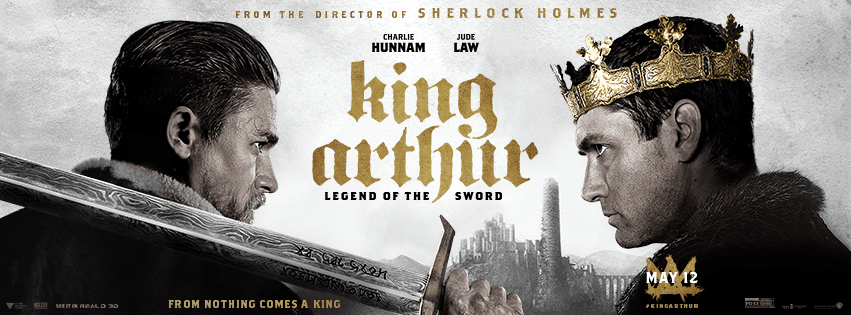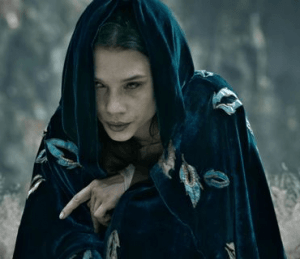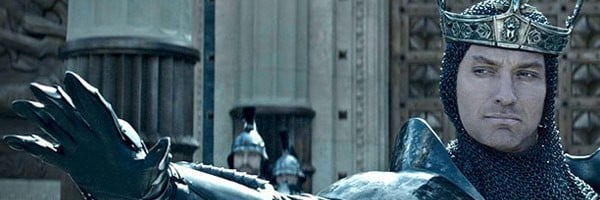
There are some film directors who have such a strong imprint on their films that regardless of the story, you know what kind of cinematic experience you’re in for when you walk in the theater. Michael Bay loves his explosions. Quentin Tarantino loves his violence. And Guy Ritchie? He loves his style. His oeuvre encompasses some of the coolest, most visually striking films in the last decade, including ‘The Man from UNCLE’ and the Robert Downey Jr.-powered ‘Sherlock Holmes’ films.
Working with these existing properties, he’s certainly not a stickler for the storyline and indeed his take on the famously fastidious consulting detective rankled a lot of purists, even as the Holmes films were darn entertaining and beautifully assembled.
And so it’s no surprise if I open up this review by saying Ritchie has done it again with ‘King Arthur: Legend of the Sword.’ He’s basically thrown the wonderful mythos of King Arthur and the Knights of the Round Table into a blender along with his tried-and-true storytelling and visual elements and created a film that doesn’t entirely make sense but is sure a lot of fun.
The central character of the film is Arthur (Charlie Hunnam), whose father, King Uther (Eric Bana) has forged a peaceful relationship with the mages and magicians in the kingdom. Unfortunately, his colleague Vortigern (Jude Law) isn’t quite so pure and has let his desire for power pull him over to the dark side. Through various dark machinations, King Uther and Queen Igraine (Poppy Delevingne) are killed and a very young Arthur is quite literally sent down the river, to be rescued and raised in a brothel.
Vortigern has meanwhile taken on the crown of the King and rules through tyranny, crowing about how there’s a certain feeling that comes from having your subjects fear you. But Excalibur, the great sword that Uther wielded, is trapped in a stone that suddenly appears. Who can pull the sword from the stone other than the true King of England?
You know the basics of the myth, I’m sure; Arthur pulls the sword, Vortigern wants to kill him, Arthur has to defend the honor of England and its downtrodden peoples. Etc etc. Except in the hands of director Guy Ritchie and writer Joby Harold, there are layers of weird and fairly random mysticism.
 Enter The Mage (Astrid Berges-Frisbey) who keeps pushing the story forward when it falters and who leads Arthur into “the dark lands” so he can learn to wield the magical Excalibur. These are some of the most fanciful scenes in the film and also some of the most incoherent. What is this other dimension? Why does Arthur have to go into it to learn how to put two hands on the sword (no, that’s not a metaphor) and what is it about the vision he sees when he’s holding the sword that relates to the death of his father and him assuming the throne?
Enter The Mage (Astrid Berges-Frisbey) who keeps pushing the story forward when it falters and who leads Arthur into “the dark lands” so he can learn to wield the magical Excalibur. These are some of the most fanciful scenes in the film and also some of the most incoherent. What is this other dimension? Why does Arthur have to go into it to learn how to put two hands on the sword (no, that’s not a metaphor) and what is it about the vision he sees when he’s holding the sword that relates to the death of his father and him assuming the throne?
Ya know what though? It doesn’t matter. The story doesn’t matter. The fact is that the majority of King Arthur: Legend of the Sword is just fun special effects, great visuals, a dynamite soundtrack by long-time Ritchie collaborator Daniel Pemberton and even a few laughs here and there. The film lags in a few spots where there’s a bit too much exposition, but while the purist fan of the wonderful King Arthur legends cringed at the massive dramatic license, the moviegoer in me laughed, grinned and enjoyed the spectacle of the movie.
And that’s ultimately what distinguishes Guy Ritchie movies; they’re a paen to the visual language of cinema, respectable entries in the bottomless hunger for mindless, escapist entertainment on the big screen. And with that in mind, put aside your visions of Guinevere, Lancelot, jousting and noble warriors in banged-up armor defending the crown and the realm and just go enjoy ‘King Arthur: Legend of the Sword’ as a fun ride all its own.

